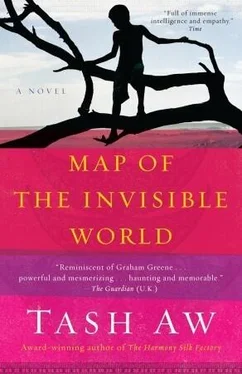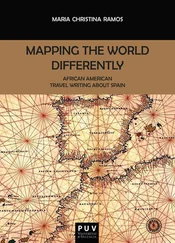Tash Aw - Map of the Invisible World
Здесь есть возможность читать онлайн «Tash Aw - Map of the Invisible World» — ознакомительный отрывок электронной книги совершенно бесплатно, а после прочтения отрывка купить полную версию. В некоторых случаях можно слушать аудио, скачать через торрент в формате fb2 и присутствует краткое содержание. Год выпуска: 2010, Издательство: Spiegel & Grau, Жанр: Современная проза, на английском языке. Описание произведения, (предисловие) а так же отзывы посетителей доступны на портале библиотеки ЛибКат.
- Название:Map of the Invisible World
- Автор:
- Издательство:Spiegel & Grau
- Жанр:
- Год:2010
- ISBN:нет данных
- Рейтинг книги:4 / 5. Голосов: 1
-
Избранное:Добавить в избранное
- Отзывы:
-
Ваша оценка:
- 80
- 1
- 2
- 3
- 4
- 5
Map of the Invisible World: краткое содержание, описание и аннотация
Предлагаем к чтению аннотацию, описание, краткое содержание или предисловие (зависит от того, что написал сам автор книги «Map of the Invisible World»). Если вы не нашли необходимую информацию о книге — напишите в комментариях, мы постараемся отыскать её.
comes an enthralling novel that evokes an exotic yet turbulent place and time—1960s Indonesia during President Sukarno’s drive to purge the country of its colonial past. A page-turning story,
follows the journeys of two brothers and an American woman who are indelibly marked by the past — and swept up in the tides of history.
Map of the Invisible World — читать онлайн ознакомительный отрывок
Ниже представлен текст книги, разбитый по страницам. Система сохранения места последней прочитанной страницы, позволяет с удобством читать онлайн бесплатно книгу «Map of the Invisible World», без необходимости каждый раз заново искать на чём Вы остановились. Поставьте закладку, и сможете в любой момент перейти на страницу, на которой закончили чтение.
Интервал:
Закладка:
“Do you ever miss Leiden?” she asked. They were traveling alongside a canal filled with stagnant black water covered in a film of grease.
He shrugged. “Not really.”
“But you said you liked it. You did really well there — academically, I mean.”
“I didn’t like the cold.” He could be like this, uncommunicative to the point of sullenness. Margaret wondered if he suffered from that respect of hierarchy that (she had noticed) seems to plague all Asians, so that she, being his elder and superior, could never be a companion with whom he could converse freely. It troubled her somewhat to think of herself as a Mother Superior figure, wizened and stern.
“I can understand that,” she said, deciding not to push too far. She wished he would relax in her company, and she began to imagine how the evening might proceed if she had her way. They would have something simple to eat at a street stall and then they would have drinks, lots of them, and at some point in the evening he would begin to confide in her, telling her all about his village sweetheart and the girls he had had in Holland; he would begin to trust her, think of her as his equal, his confidante, and the next morning, at work, they would be friends and colleagues and she would no longer feel awkward in his company.
She was not sexually attracted to him; she wanted to make that clear. She had worked out that he was twenty-four going on twenty-five; not quite twenty years her junior but certainly young enough to be her son in this country where girls of eighteen often had three children. Besides, she had long since shut out the possibility of romance. Once, in an age of endless possibilities, love had presented itself to her and it had seemed so simple, so attainable that all she had to do was reach out and claim it. Falling in love then had felt as easy as swimming in a warm, salty sea: All she had to do was wade into it and the water would bear her away. But she had not done so, and now the tide had retreated, leaving broken bottles and driftwood and tangled nets. It was a landscape she had learned to live with.
The lights had just come on in Pasar Baru. The air was filled with the steady hum of portable generators and strings of naked bulbs burst sharply into life, casting their harsh glare on to the faces of passersby. There were not many people there yet, and Margaret and Din were able to stroll around for a few minutes before settling on a place to eat.
“What do you feel like eating?” Margaret asked.
“Anything. It’s up to you.”
She’d known he would say that and had therefore already decided. “Why don’t we just grab some nasi Padang? Since you’re Sumatran. It’ll make you think of home.”
They chose a place at random, sitting down at a folding table that wobbled when Margaret put her elbows on it. Din sat facing her, though he did not look at her face but stared into the space beyond her left shoulder. He looked clean and neat, as he always did, his plain, white short-sleeved shirt uncreased even at the end of the day. He never seemed to perspire. This evening he was not wearing the thick, black-rimmed glasses that he wore at work, and Margaret was glad because she had a clearer view of his eyes. “Isn’t this nice?” she said. “The first time we have been out together.” Even as she said so she was aware of the inappropriateness of it: she, a white woman, he a young Javanese man, together in public. They didn’t like this kind of behavior, the Indonesians, she knew that. Perhaps this was why he was being so stiff. She looked around quickly but could see no other foreigners. A young woman came and took their order; she looked sexless in her baggy male clothing — oversized shirt, but toned at the collar, and dirty, pleated trousers — and disapproving. Margaret felt her own décolletage, modest though it was, suddenly too revealing.
“Tell me about the research you started in Holland,” Margaret said once they had ordered. They were on surer ground if they stuck to work matters; he liked talking about his work. “Pre-Islamic religion, wasn’t it?”
“More or less,” he said, his gaze shifting gently but noticeably so that he met her eye and held it. It caught her off guard, this sudden switching of moods, and she blinked and smiled to hide her unease. She didn’t like being taken aback this way. “Actually it was a bit wider than that,” he continued. “I was looking into writing a secret history of the Indonesian Islands in the Southeast, everything from Bali eastward. To me those islands were like a lost world where everything remained true and authentic, away from the gaze of foreigners — a kind of invisible world, almost. Such a stupid idea.”
“Why stupid?”
“Oh.” He smiled, suddenly bashful again. “Such a big subject — too big for a little guy like me.”
“I think it’s a wonderful idea. You shouldn’t give up.”
“No, there’s no hope for someone like me. I was stupid to think I could do something like that, as if I were a Westerner.” He spoke with no bitterness but a despair so deep that it felt almost calm. He won’t be shaken from it, thought Margaret; it was so frustrating.
“What a thing to say,” she said, trying not to sound didactic. “You can do anything you put your mind to. I’m not saying it’s easy, but if you want something, you’ll get it. Don’t be so defeatist.”
The food arrived, dishes of watery curries of meat and vegetables. Margaret peered at the rice and noticed that it had been mixed with maize. “I think we have a civic-conscious vendor on our hands,” she said. Since the previous year’s drought every meal was a lottery. Sometimes your rice would be rice, other times it would be a gritty bowl of ground meal, in accordance with government recommendations.
“Maybe you’re right,” Din said with a shrug. He spoke as if trying to convince himself of something. “My idea was that we needed a history of our country written by an Indonesian, something that explored nonstandard sources that Westerners could not easily reach. Like folk stories, local mythology, or ancient manuscripts written on palm leaves—”
“Lontar , you mean.”
“Yes. When you think about the standard approach to history, all the historical texts, you’re really talking about Western sources. It’s as if the history of Southeast Asia started with the discovery of the sea routes from Europe to Asia. Everything begins at this point in time, but in fact so much had already happened. The empires of Majapahit and Mataram had been established; Islam, Hinduism, Buddhism … I wanted to retell the story of these islands because I have a theory that their history is beyond the comprehension of foreigners — sorry, you’ll forgive me for saying that, I know—”
“Forgiven—”
“—and that history has to be told by a voice that is non-Western …”
Din continued talking, but Margaret had become distracted by a boy who had sat down three tables away. He was an Asian of indeterminate age — anywhere from fourteen to twenty-one — not malnourished like most of them were, but still somehow ragged. His dirty white T-shirt bore a logo of an animal on the front (a bear?) under blue and gold letters that said BERKELEY. He appeared at once lost and deeply focused. Was he looking at them? She glanced at him once or twice and each time he ducked away just as she turned her head in his direction. Establishing eye contact too freely was a mistake many foreigners she knew made, misjudging Asian regard. What their smiling faces suggested was not always accurate, and what your own smiling face transmitted was not always what you intended. There was nothing on his table; he had not ordered food or drink.
“… and of course the unknown story of Muslim seafarers.”
Читать дальшеИнтервал:
Закладка:
Похожие книги на «Map of the Invisible World»
Представляем Вашему вниманию похожие книги на «Map of the Invisible World» списком для выбора. Мы отобрали схожую по названию и смыслу литературу в надежде предоставить читателям больше вариантов отыскать новые, интересные, ещё непрочитанные произведения.
Обсуждение, отзывы о книге «Map of the Invisible World» и просто собственные мнения читателей. Оставьте ваши комментарии, напишите, что Вы думаете о произведении, его смысле или главных героях. Укажите что конкретно понравилось, а что нет, и почему Вы так считаете.












